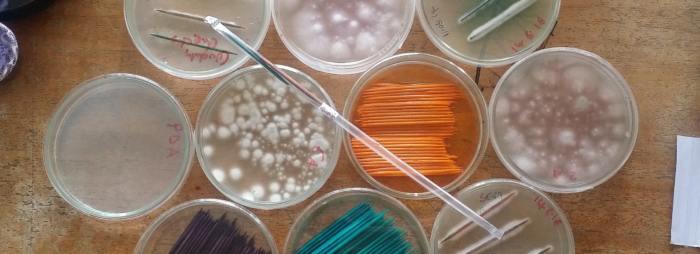 To mitigate Africa’s greatest threat to food security, Striga hermonthica, an invasive plant commonly known as witchweed, Claire Sands Baker ’93 is starting at the root of the problem.
To mitigate Africa’s greatest threat to food security, Striga hermonthica, an invasive plant commonly known as witchweed, Claire Sands Baker ’93 is starting at the root of the problem.
Striga decreases the crop yield of about 40 million subsistence farmers across the African continent. Shortly after germination, the weed secretes enzymes that digest the host plant’s roots. After a certain concentration of the enzyme has been released, the parasitic plant sends out projections to further suck nutrients from the host plant, reducing crop yields by 20 to 80 percent in over 18 countries in sub-Saharan Africa. However, Striga‘s consequences extend far beyond subsistence farmers’ fields and lead to an annual income loss of over $9 billion, money necessary to pay for housing, food, and education.
As director of the Toothpick Project, Baker collaborates with self-sufficient subsistence farmers in Kenya as well as non-governmental organizations to systematically target Striga.
“One weed, one solution. It’s simple: It’s on a toothpick.”
The Toothpick Project began more than a decade ago when Baker’s uncle, John Sands, MD, volunteered in Kenya after he retired as acting chief surgeon for the U.S. Navy. Noticing that his patients visited him not only with physical ailments, but also with concerns about their families, farms, and livelihoods, John called upon his brother, Baker’s father, David Sands PhD, PO’63, to help a sustainable Striga strategy. After successfully isolating a native strain of fungus traditionally used for bio-control of Striga, the brothers were able to create a more virulent version to attack the pest—and that’s where the toothpicks come in.
The Toothpick Project’s method for distributing the fungus to farmers in Kenya is simple and inexpensive. In the lab, a toothpick is placed in a petri dish of the isolated fungus Fusarium oxysporum f. sp. strigae. After the toothpick has been embedded with the fungus, it is hermetically sealed inside a straw and sent to a subsistence farmer. The farmer opens the straw and extracts the toothpick, which is then added to a heap of cooked rice. At planting time, grains of the fungus-inoculated rice are placed into the ground with each crop seed. As the crops take root, so does their defense against Striga, with the inoculum preventing the weed’s parasitism.
Since its official launch in early 2016, the Toothpick Project has grown in scale and efficiency—large fermenters with trays and wooden dowels have replaced the smaller petri dishes and toothpicks—but the Project’s name remains as a testament to past trials and the potential for continued innovation. For example, rice is an ideal substrate to cultivate the fungus, but is also expensive.
“We’re trying gritted corn cobs amended with molasses as an alternative,” explains Baker. “These kinds of shifts have made this project less expensive. We want this to cost about a dollar for smallholder farmers, and we are on track. We have already seen increases in yield, we may just need to further decrease the price.”
Because 85 percent of subsistence farmers are women, many of whom have children, women’s empowerment is one of the Toothpick Project’s driving forces.
“Working in nonprofits, I’ve always argued for access to arts and education and a healthy environment. I acted with compassion. But, it wasn’t until I became a mother that I really added empathy to those arguments. If these [mothers’ fields] have Striga, it impacts their families’ nutrition, income, and education, and these things lead to child marriage, larger families, increased disease, and political insecurity. In my conversations with smallholder farmers, I’ve asked what they would do if they had an income. All—unanimously without hesitation—have said they’d pay for education for their children.”
Baker credits her involvement at Scripps as critical to her current nonprofit work. Holding two internship positions as well as various leadership roles, including student board representative and senior class co-president, Baker helped enact policies that shaped student life and community involvement during her years at the College.
Through her cross-continental collaboration, Baker also realizes the role technology plays in connecting partners worldwide.
“When I graduated from college in 1993, you would not be able to do this kind of work from Bozeman, Montana [the Toothpick Project’s base of operations]. The science wouldn’t make the connection, or the funding wouldn’t make the connection. There was this huge gap between what we could do in Africa and in the US. Now the world has become so much smaller because of communication technology. There is no reason why our support community can’t be global.”

